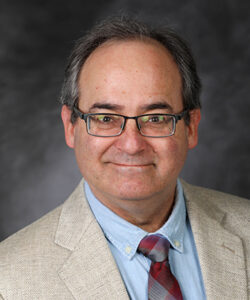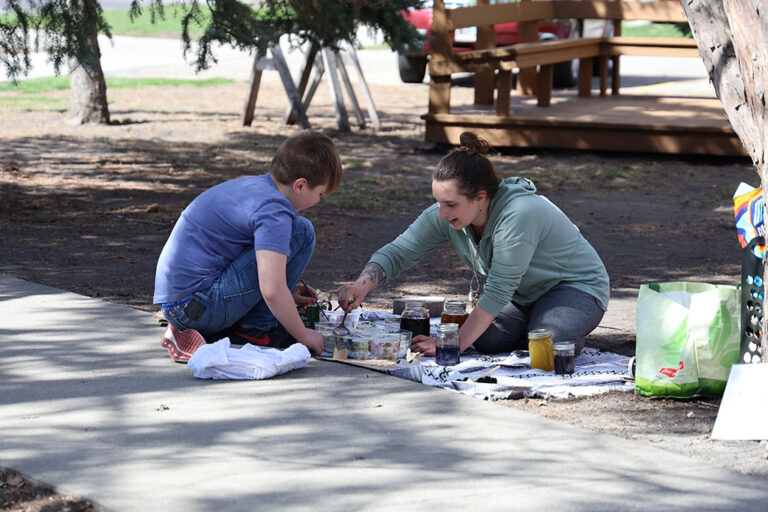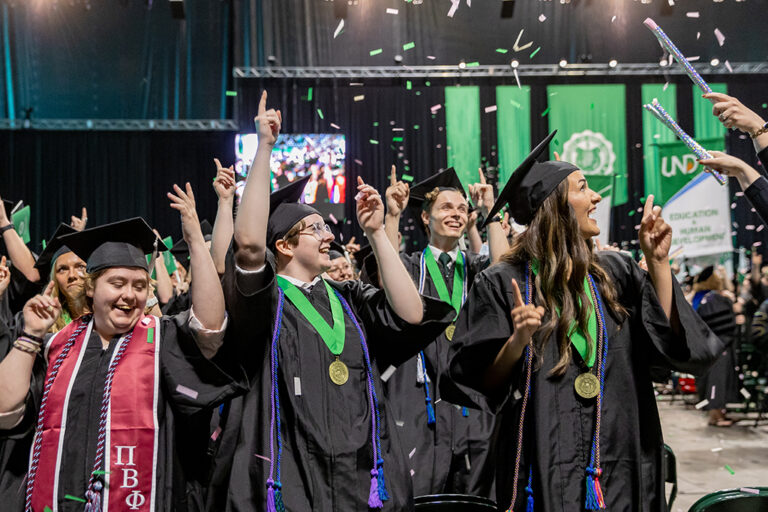Life tectonics
For geological engineer Charles Gorecki, CEO of the EERC, leadership happens where vision, character and industriousness meet

Editor’s note: A video of Charles Gorecki’s 18:83 Speaker Series talk can be found at the bottom of this story.
****
After dropping out of college twice and with a learning style complicated by dyslexia, Charles Gorecki went on to become CEO of the EERC.
That’s chief executive officer of the Energy & Environmental Research Center at UND, a position that puts Gorecki in charge of about 270 scientists, engineers and research support staff.
How did he do it? In his 18:83 Speaker Series talk, Gorecki answered that question and went on to offer a summary of the leadership tips he learned along the way.
The 18:83 Speaker Series brings campus and community leaders on Wednesdays to the Social Stair in the University’s Memorial Union. The weekly presentations on leadership are timed to last around 18 minutes and 83 seconds, a number that coincides with UND’s founding year.
Gorecki spoke as part of the 18:83 series on Jan. 17. In his talk, he started by offering a brief bio. That’s because when he was thinking about leadership, the first thing that came to mind “was the great quote from Socrates: ‘Know thyself,’” he said.
“Because to have a life where you have meaning and your leadership has meaning, you really need to know who you are, what drives you and where you‘ve come from, as well as to understand your background and your skills.”

Small-town roots
With that in mind, Gorecki offered the following:
“I grew up as the oldest of four boys,” he said. “We grew up on a hobby farm in Minnesota. My dad was a dentist, my mom ran the household, we had an acre garden … and I learned the value of hard work, ingenuity and adaptation.”
But Gorecki struggled in elementary school, he said. “And it wasn’t until fifth grade when they identified the fact that I couldn’t read because I have dyslexia.”
The diagnosis made good help available, and Gorecki proceeded to do much better, especially in science classes. So after graduating from high school, off he went to college; but then after only a year on campus, he dropped out.
“I really didn’t know what I wanted to do, so I didn’t apply myself” – the same situation faced by many students on campus today, he said.
Gorecki joined the National Guard, thinking that would help him gain direction. Then he went back to college – only to drop out again.
All of which brings us to Sept. 10, 2001, a date that found Gorecki working at odd jobs in Grand Forks.
On that day, “my father was tragically killed in a car accident,” he said. “And as you know, that also was the day before 9/11.
“So my entire world was shattered and shaken to the core. And it really made me reflect on who I was and what I wanted to do.”
Gorecki re-enlisted in the Army National Guard and wound up serving as a combat engineer in Iraq. After returning home, he focused once again on school, this time successfully.
Ultimately, he would earn degrees in geological engineering and petroleum engineering, both at UND.
“And so I’ve learned a lot from those experiences,” Gorecki said.

Lessons from life
Message for students: You can learn from your experiences, too. “You’re here in this bastion of learning at the University of North Dakota, one of the best places that you can possibly be to learn things.”
Moreover, “it’s not just the formal education that you’re receiving here,” he said. “It’s also about the people and the interactions that you have. It’s the things that you learn through your travels, through your experiences, that really help define who you are, and then help set you on a good path.”
Or as Albert Einstein – one of Gorecki’s heroes – put it, “Education is not the learning of facts, but the training of minds to think.”
With that in mind, Gorecki offered some observations on leadership:
* Bring together different people from different backgrounds with different ideas. You’ll be amazed how such a mix of people can catalyze ideas, innovation and productivity, he said.
* Surround yourself with great people – and not just to work with or hire, but also to be your mentors and friends, if possible. “Not only did I have great mentors at the EERC, but also in my professional career in geological engineering – CO2 storage is my area of expertise – I made a point of seeking out the world experts in that topic, and trying to make them my mentors,” he said.
“And fortunately, that’s exactly what happened.” If you take the initiative to make such inquiries, you’ll be surprised how receptive people can be, he said.
* Have a vision. In addition, “I think it’s important to associate yourself and your vision with places that have a vision you can connect with,” he said.
“And wherever you’re at, if you feel like your institution’s core values don’t really match yours, “then probably you need to be someplace else – someplace where the values you hold fit with your organization’s.”
* “The next thing I think about is having integrity,” he said. “If you don’t have integrity, if you’re not truthful, if you don’t have a good set of values, then nobody’s going to follow you.”
Or as General of the Army and former President Dwight Eisenhower put it, “The supreme quality for leadership is unquestionably integrity. Without it, no real success is possible, no matter whether it is on a section gang, a football field, in an army, or in an office.”
* Last but not least, “none of this comes easy,” Gorecki said. “There are going to be lots of challenges along the way. … There are some things that you learn through classes, reading or life experiences, but you still need to put in the work.”
To recap, surround yourself with great people. Have a vision. Have integrity.
“And then put in the work,” Gorecki said. For as the great Vince Lombardi said, “Leaders are made, they are not born. They are made by hard effort, which is the price which all of us must pay to achieve any goal that is worthwhile.”
****
Video of Charles Gorecki’s 18:83 Speaker Series talk:



